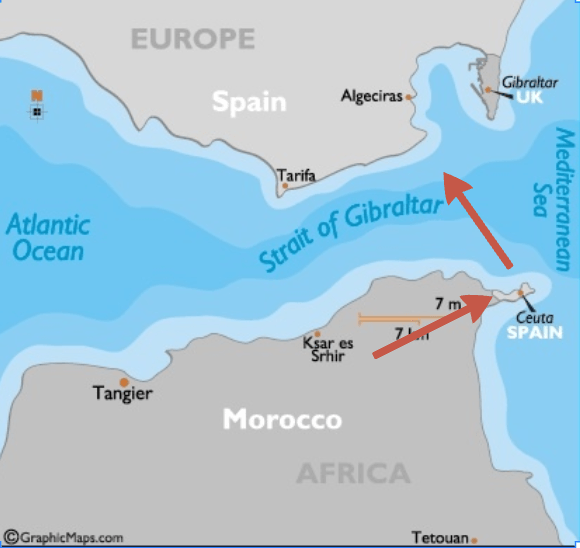Foreign Unaccompanied Minors in Street Situation: From “Dangerous Children” to Children in Danger
Posted:
Time to read:
Guest post by Elisa García-España and Jacqueline Carvalho. Elisa is Professor of Penal Law and Criminology, head of the OCSPI and of the PREMECE Program, and has extensive research experience on the criminality and victimization of immigrant populations, prisons, immigration detention, racially profiled police stops, and prevention of crime. She is on Twitter @Elisa_G_Espana. Jacqueline has PhD in Sociology, is the coordinator of the PREMECE Program and has research experience on police organisations, media coverage of immigration and prevention of victimisation and crime of the immigrant population. She is on Twitter @CarvJacqueline.
The juvenile delinquency prevention program for foreign unaccompanied minors in street situations in Ceuta (PREMECE) is a pilot program, which included both research and social interventions carried out between April 2018 and July 2019. PREMECE is the result of an agreement between the city of Ceuta and the University of Malaga (Spain) that aimed to prevent the delinquency of minors who had escaped the established child protection system and wandered around the port zone of the city. These minors were at risk of delinquent behaviour, consuming drugs and engaging in fights.
Ceuta has a border with high youth mobility and, together with Melilla, are the only land borders between Spain and Morocco. Once on Spanish soil, the state must ensure the wellbeing of every unaccompanied minor and protect them regardless of their migration status. However, many Moroccan adolescents want to cross the Straight of Gibraltar, a maritime strip that separates Africa from Europe, therefore, they live in the streets near the port area waiting for an opportunity to sneak into a truck or a boat travelling to the Spanish peninsula. Their presence on the streets of Ceuta generates a sense of public insecurity and social alarm, as a result of the stigmatization of these minors as dangerous by citizens, the police, the media and some political parties. During 2019, Save the Children launched a campaign to raise awareness of the stigma attached to these minors and to act as a reminder that they are children, subjects of protection.

The PREMECE project recorded 50 minors per month in street situation in Ceuta. This number fluctuated quite a lot due to the high cross-border mobility of this group. The project’s intervention strategies consisted of:
- Creating a street intervention team trained in positive parenting strategies. The Drari team was composed of two social educators and a psychologist. “Drari” means “guys” in dariya, the native language of Moroccan boys, which is what they usually call each other. The Drari team acted as guardians of these children helping ensure that all children’s basic needs, rights, and protections were met.
- Developing educational, artistic, sports and leisure interventions, aimed at the acquisition of different social skills, adapted from the Prosocial Thinking Program (PTP) in its abbreviated version for young people (Ross, Garrido & Fabiano, 1991).
- Coordinating with key stakeholders (reception center, police, juvenile justice system and health system) to improve the protection afforded to minors in street situation, inspired by the Communities that Care program (Brown al., 2007, Hawkins et al., 2008).
The Drari team, also conducted participant observation with the children. The team members had two research tools to systematize the information derived from participant observation: (1) field diaries and (2) individual diagnostic reports.
According to official data (National Police and Juvenile Justice System) most unaccompanied foreign minors do not engage with criminal behaviour in Ceuta. The most frequent crimes committed by a small group, between 2017 and 2019, were petty thefts, minor assaults, attempted robbery and use of a false or falsified document. The judicial measures applied in most cases were juvenile probation and community service. During the implementation of PREMECE, the minors’ crime rates decreased considerably (figure 2).

Evolution of the delinquency among unaccompanied minors in Ceuta (Source: National Police and Juvenile Justice System 2017,2018, 2019 until July)
There are four possible explanations for this decrease. First, 30% of the project’s beneficiaries decided to enter the reception center in the area or return to Morocco with their families, leaving the street. However, since the flow of young people is constant, we cannot argue that this is the only factor responsible for the decrease. Second, the activities offered by the Drari team played a role as they kept children occupied. Furthermore, the experienced street workers managed to reduce tensions, avoiding conflict and mediating between the minors. Third, another reason that could explain the decrease in the number of judicial measures imposed could be the quality of legal aid the children in the program were afforded.
Finally, working closely with the police helped, to some extent, to shift from a security perspective to a child protection perspective. The PREMECE project aimed to streamline a children's perspective in police work, questioning the process of stigmatization and the levels of police legitimacy among the minors. Local Police commanders supported the program and the Drari team collaborated directly with two local police officers who voluntarily expressed interest and became spokesmen for it in Ceuta's police organisations. As a result, the children expressed that they felt listened to and they began to report directly to the police when they were assaulted, felt threatened or even collaborated when they knew about criminal acts in the port. While, changing the perspectives of law enforcement personnel takes time and would require more than 15 months, the duration of the project, shifting from accounts of ‘dangerous’ children to children in danger is considered to be a key success of the PREMECE project.
Any comments about this post? Get in touch with us! Send us an email, or post a comment here or on Facebook. You can also tweet us.
__________
How to cite this blog post (Harvard style)
García-España, E. and Carvalho, J. (2021). Foreign Unaccompanied Minors in Street Situation: From “Dangerous Children” to Children in Danger. Available at: https://www.law.ox.ac.uk/research-subject-groups/centre-criminology/centreborder-criminologies/blog/2021/10/foreign [date]
Share:








